Investing In America's 21st Century
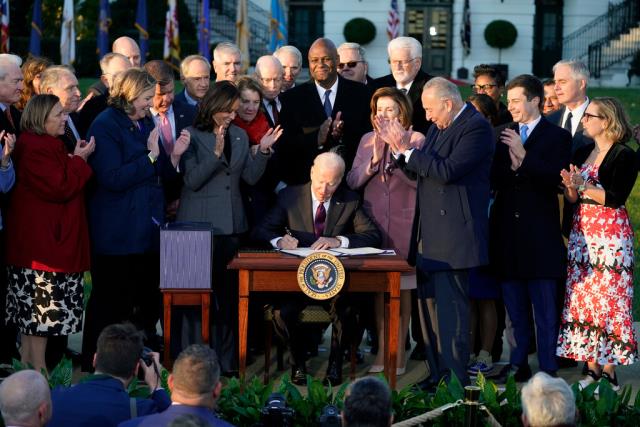
In the middle of November, I joined a number of my colleagues at the White House for the signing of the Infrastructure Investment and Jobs Act — which mostly gets talked about as the Bipartisan Infrastructure Bill. Whatever you call it, it’s going to deliver for Maine — just as the American Rescue Plan we passed in March has done, and continues to do. As a matter of fact, 2021 will likely be seen as a game changer when it comes to Maine’s economic prospects — especially when it comes to affordable broadband access across the state.
When I ran for Senate in 2012, the very first opinion column I wrote was about the need to expand broadband access in Maine. At the time, I argued that in the 21st century, “high-speed Internet is the major channel for information and interconnection … just as roads, bridges, canals and electric lines were in the past.” Nearly 10 years and one globe-altering pandemic later, that statement has been proven true beyond my wildest predictions.
Today, we all know that an affordable, high-speed broadband connection isn’t a luxury — it’s an absolute necessity for anyone who wants to fully engage in 21st century life. The pandemic didn’t create the digital divide, but it did expose it for all to see. As schools and offices closed, students and workers without reliable internet scrambled to stay on top of their responsibilities, and seniors and vulnerable populations had to find ways to access critical telemedicine appointments. Action was more than possible — it was urgent.
I’m proud to say that Congress rose to the moment, passing the nation’s two largest-ever investments in broadband infrastructure with the American Rescue Plan and the Bipartisan Infrastructure Bill. As a result, in the years ahead Maine is expected to receive more than $400 million in federal broadband funding.
These funds will go a long way to ensuring that every Maine person — no matter where they live — will be able to fully access the economic, education, and healthcare opportunities of the 21st century. I shared a bit more about what these historic broadband investments will mean for Maine people in this Bangor Daily News op-ed.
But the Bipartisan Infrastructure Bill will also do so much more than just expand broadband, including:
- Investing $1.3 billion in Maine roads through federal-aid highway apportioned programs, and $225 million for Maine bridges – the largest investment of its kind since the construction of the interstate highway system.
- Delivering $74 million for infrastructure development at Maine's airports.
- Providing clean, safe drinking water for all Maine communities with a $390 million investment to improve water infrastructure across the state.
- Helping to address our nation’s truck driver shortages (which is contributing to supply chain issues) by passing my DRIVE Safe Act, which will allow young truck drivers to enter an apprenticeship program to help jumpstart their careers and get more drivers on the road.
It’s nearly impossible to capture just how much the Bipartisan Infrastructure Bill will do for the State of Maine — but in the months and years ahead, we will see the legislation’s impacts unfold before our eyes and throughout our communities. I’m deeply grateful for the partnership of all who helped enact this historic package into law; it wasn’t easy, but it was important, and we got it done.
Protecting Our Fragile System of Self Government
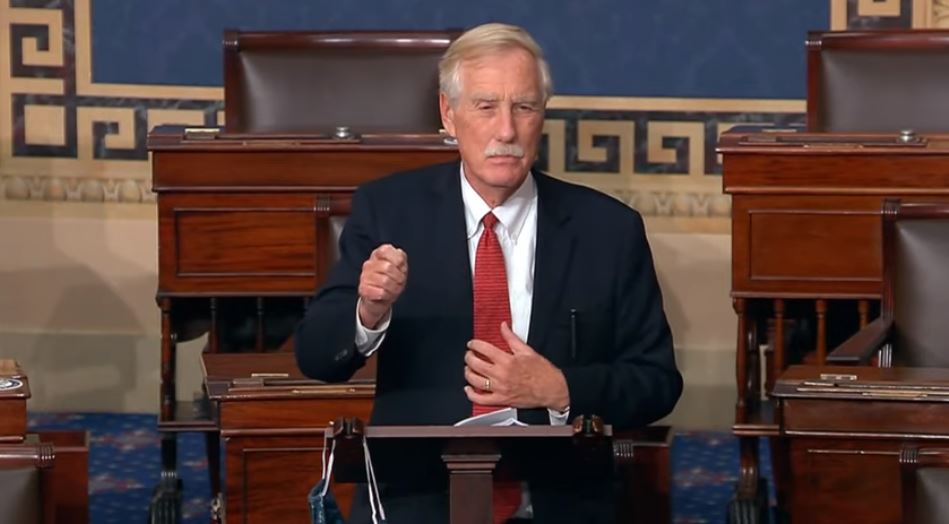
Centuries after our nation’s founding, it can feel like the American republic is promised to us; that the United States will always solve its problems through elections and sustain our time-honored tradition of peaceful transfers of power. But in reality, the United States is a 245-year-old experiment in self-government that defies historical norms defined by kings, dictators, and, more recently, presidents-for-life. We are an anomaly — and a fragile one at that.
This is why I was profoundly frustrated when almost all of my Republican Senate colleagues voted against opening debate on the John Lewis Voting Rights Advancement Act earlier this month. The legislation, named in honor of the late civil rights hero, would have restored important parts of the landmark Voting Rights Act and curbed voter suppression efforts underway in state legislatures. Not only did my colleagues vote against discussing this important bill, they haven’t even suggested what voting rights improvements they would be willing to discuss.
In 2006, the Senate voted 98 to 0 to reauthorize the Voting Rights Act — because each member of the Senate, regardless of party, recognized that access to the ballot is fundamental to American democracy. Only 15 years later, the support for voting rights that once was unanimous has become divisive — and it seems that most of my Republican colleagues have decided to pick their voters rather than have voters pick them. Around the country, we are seeing states enact burdensome voting laws that will make it harder for many Americans to exercise their right to vote — and all indications are that the laws will disproportionately affect communities of color, who have long been denied this right through some device or another. Yet somehow, 49 of my colleagues have decided this is not a problem that requires solving.
I am an eternal optimist, who will continue working for a compromise — but at some point, I feel I must believe my colleagues when their actions make clear that they have no interest in safeguarding the democratic process. If that is the case, I will explore any other feasible alternative to restore our democracy and carry on the legacy left behind by the great John Lewis and so many others.
You can read my full thoughts on voting rights, and the fragile state of our democracy in my new op-ed for the Boston Globe here.
Strengthening our National Defense and Bolstering Maine Communities
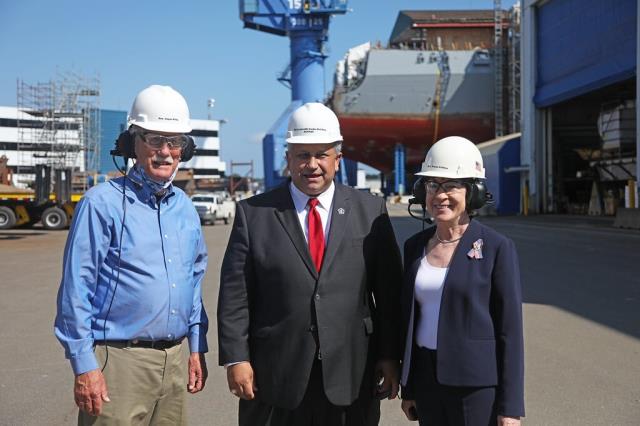
The National Defense Authorization Act (NDAA) may not make regular headlines, but it is a massively important bill for our national security, our servicemembers, and our communities. For the last 60 years, the Senate has passed this legislation on a bipartisan basis to make our nation safer and stronger. As this year’s version of the bill is negotiated on the Senate floor in the days ahead, I’m urging my colleagues to pass it quickly.
The NDAA includes a number of important provisions, including delivering a 2.7% pay raise for military servicemembers and the Department of Defense civilian workforce. This well-earned raise is part of the legislation’s effort to take care of those who put their lives on the line for our country; they take on major risks to defend us, and they deserve our full support.
The legislation drafted by the Senate Armed Services Committee also includes significant support for shipbuilding priorities, which will support good-paying jobs at Bath Iron Works and the world-class ships constructed by the shipyard’s employees. These funds will support Maine communities, strengthen the long-term future of the shipyard, and ensure that our Navy continues to receive the highest-quality, Bath-built ships to complete its missions around the globe.
Those are just two of the many, many important provisions in this bill – which will also help address our nation’s inadequate cybersecurity, improve our ability to compete in the Arctic, and much more. Just before Thanksgiving, I spoke on the Senate floor to highlight the benefits of this bill and urge its passage; you can watch my full speech here.
Shopping Local and Supporting Small Businesses This Holiday Season
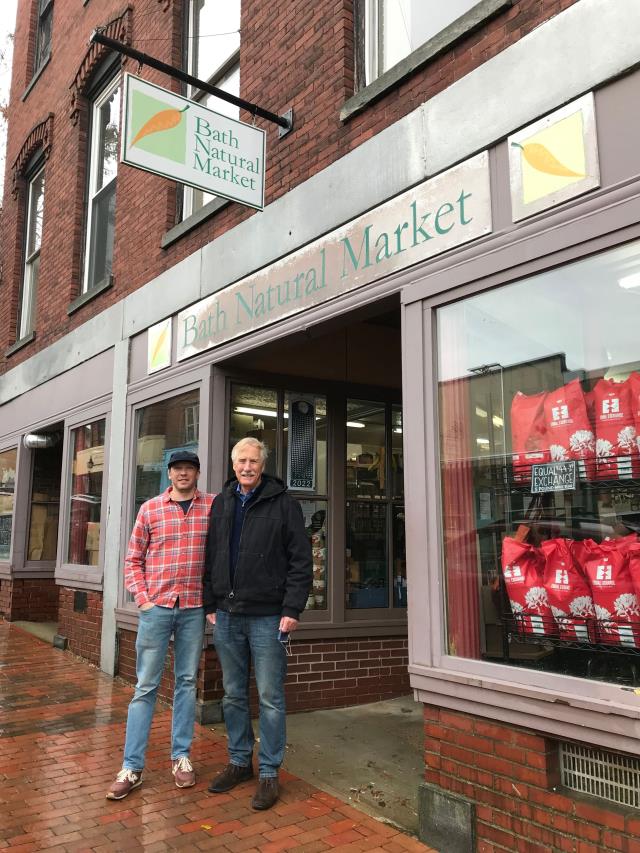
Maine’s small businesses aren’t just a shop on the corner – they’re a fundamental part of our state’s economy and character. They create high-quality products that help define our neighborhoods, and support good-paying jobs for our friends and neighbors. For generations, these businesses have supported our communities and now — as the COVID-19 pandemic has stretched many of these local treasures to their limits — it's our turn to support them.
Ahead of the holidays and 'Small Business Saturday' I toured Downtown Bath small businesses to discuss impacts of COVID-19 and remind Maine people: when you think holiday gifts this year, think local.
For all the talk of issues with the supply chain, the simplest path to a gift is walking down the street. You’ll get a great present for your loved ones, and support your neighbor at the same time.
Honoring Those Who Served
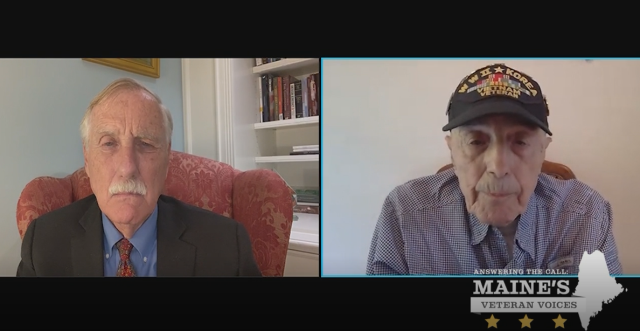
For almost 250 years — from Gettysburg to Normandy — generations of Maine veterans have selflessly answered the call in defense of our freedom, democracy, and in pursuit of a more fair and just nation. As Americans, we have a collective responsibility to recognize and honor their service, to share their stories with our children and grandchildren — because all Americans must know that our nation’s achievements would not be possible without their tremendous sacrifices.
That is why it was such an honor for me to speak with Carmine Pecorelli, a Belfast resident who served in World War Two, the Korean War, and the Vietnam War in the Navy, Air Force, and Army respectively. We spoke a couple of days before Veterans Day, and Carmine shared his deep passion for service, his unparalleled love of America, and the story of why he dropped out of school to join the Navy after Pearl Harbor. Carmine truly represents the best of America, and it is men and women like him that have made our country strong.
My conversation with Carmine was the first of a project I’m calling “Answering the Call: Maine’s Veteran’s Voices." Each month, I’ll talk to a veteran about their service, in order to keep a record of their lives, service, and sacrifices for the Library of Congress’ Veterans History Project. As one of the states with the highest proportion of veterans, there's a tremendous need to gather these stories here in Maine – and I hope our conversations will reflect upon the important legacy of our veterans. As Carmine repeatedly told me: ‘Dio benedica l'America’ — God Bless America.
“Answering the Call: Maine’s Veteran’s Voices” is being conducted in coordination with the Library of Congress’s Veterans History Project; you can learn more about the project and watch the full interview here. If you have a friend or neighbor you think I should talk with, please contact one of my Maine offices and share his or her name with my team!
November Policy Update
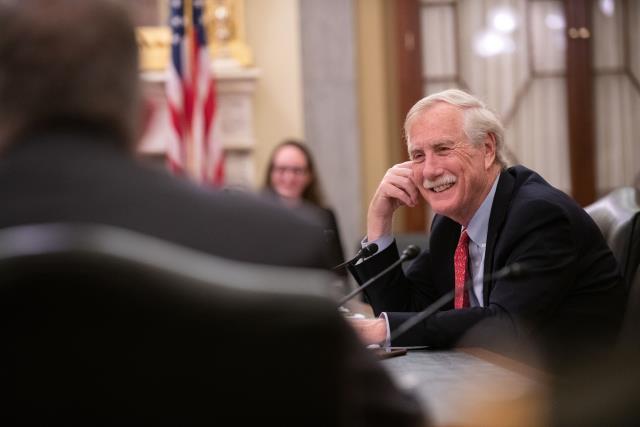
As a reminder, you can read more on my regularly updated press release page at king.senate.gov. Here are some other priorities I’ve been working on:
- Helping Vacationland recover from COVID's impacts. Thanks to the American Rescue Plan, Maine will be receiving $10,817,267 to strengthen our tourism economy. The funds will be used to upgrade recreational infrastructure, support short and long-term economic development, and create a new marketing campaign promoting outdoor recreation in Maine. Read more HERE.
- Designating the York River as 'Wild and Scenic'. The Senate Energy & Natural Resources Committee’s passed my legislation with broad bipartisan support to designate the York River as part of the National Park System’s “Wild and Scenic” Rivers program. The designation would protect the river and surrounding areas from development and provide important federal funds to the region. The bill now heads to the Senate floor for full consideration. Read more HERE.
- Combatting rising heating and energy costs. During a hearing of the Senate Energy and Natural Resources Committee, I emphasized the harmful, expensive impact that unchecked liquid natural gas (LNG) exports are having as people across Maine and the country see energy and heating costs rising. In the hearing, I then previewed legislation we're working to develop that would require the Department of Energy to account for the “national interest” before approving new LNG exports. Read more HERE.
- Strengthening America's cyberdefenses. The Senate Homeland Security and Government Affairs Committee passed the Defense of U.S. Infrastructure Act – comprehensive legislation I've introduced to strengthen America’s cyber resilience, improve security in the national cyber ecosystem, and strengthen leadership within key cyber-focused federal offices. If fully passed by Congress, this legislation would mean that more than 30 of the Cyberspace Solarium Commission's recommendations would have been enacted into law. Read more HERE.
In The News
Happy Holidays – From Angus and Cookie Angus!
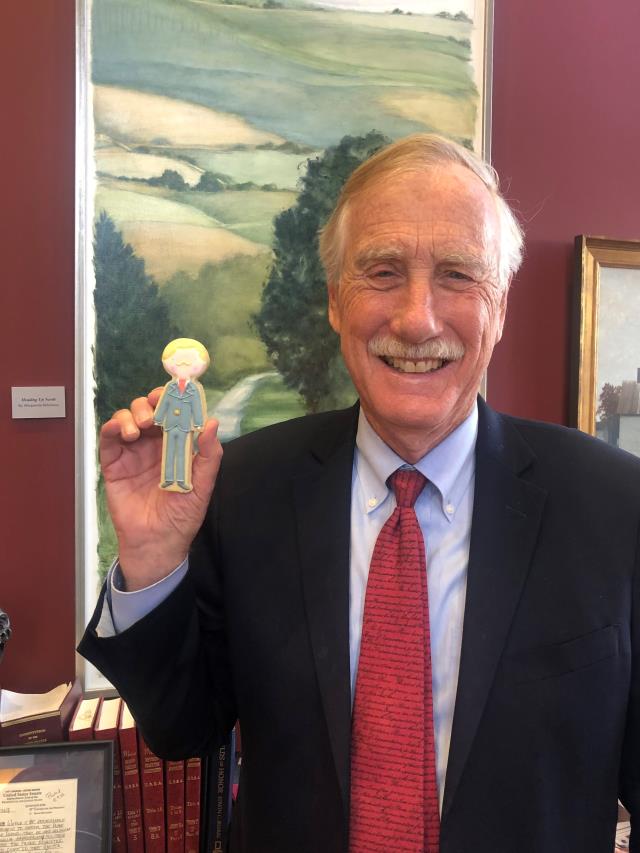
Well, it's not every day you come across a cookie version of yourself — but one of our fantastic interns thought the office could use a bit of extra holiday cheer and brought some of his mom’s unique, Maine-made cookie creations! She really nailed the likeness – if you look closely, you’ll spot a mustache on my edible doppelganger. From me and my friend here, wishing you and your families a happy, healthy, and safe holiday season.
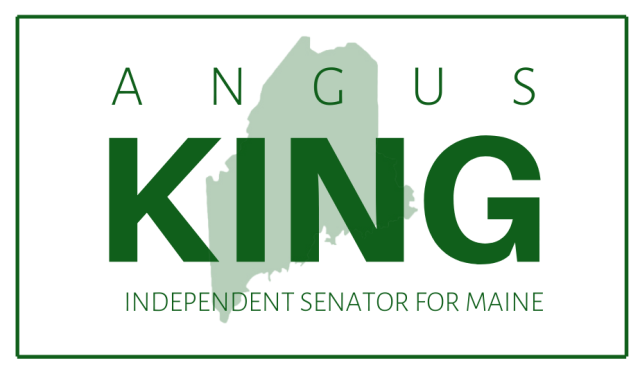
Thanks for subscribing to my monthly newsletter! I would love to hear your ideas for how we can make Maine and our country a better place. Please feel free to reach out with any questions, comments, or concerns by visiting: https://www.king.senate.gov/contact —we look forward to hearing from you.
***PLEASE NOTE***
Due to the impacts of COVID-19, my staff in Washington, D.C. are working remotely – but we’re still at work, ready to help you navigate any challenges you’re facing during this challenging time.
All the best, and stay healthy!

To unsubscribe to this e-Newsletter click HERE.
|